Fox’s Fireside – Summer Camp Edition

My wife is a genius!
Well, I knew this before I married her in 1978, but every day I work “side by side” with her on music education projects like the South Hills Junior Orchestra Online Academy (SHJOOLA – pronounced shah-ZOH-lah), I discover even more of her amazing “hidden” talents and insights!
Donna Stark Fox is the author of 99% of this Fox’s Fireside.
We launched SHJOOLA and other digital/virtual/alternative programs (like SHJO.clips) to keep our community orchestra instrumentalists practicing inspite of the school closure and restrictions caused by the pandemic. We want to foster our players’ self-confidence and motivate even greater focus on new growth and achievement in instrumental technique, key literacy, ear-training, musicianship, personal goal-setting, and artistic enrichment. As the character Jean-Luc Picard from the Star Trek Next Generation series says, ENGAGE… in the pursuit of their own inspired initiatives in music learning!
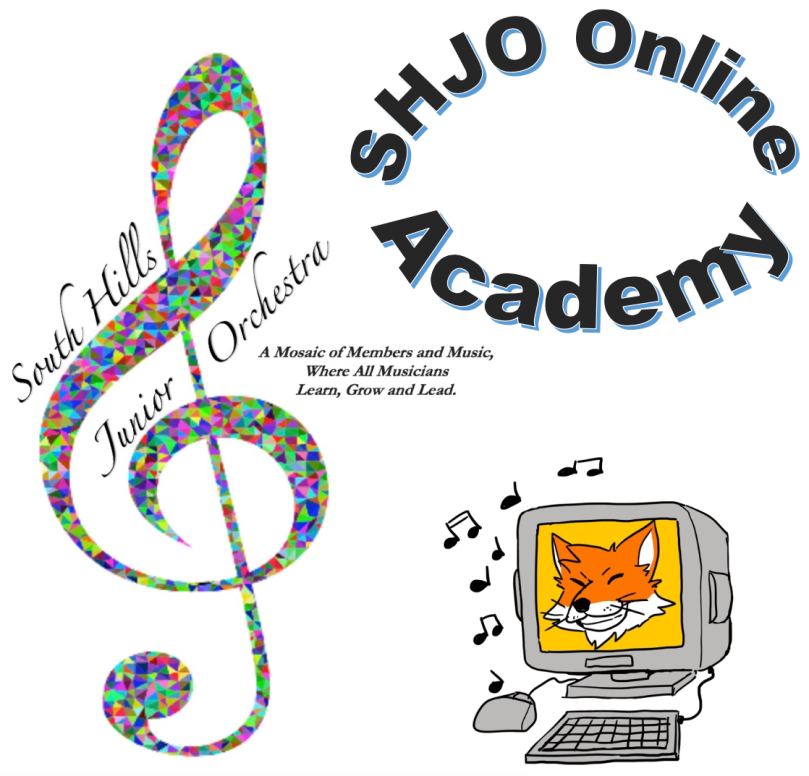
During the first week of SHJOOLA, we introduced this SMART Practice Primer (download and adapt to your own practice regime). The philosophy comes from my wife’s (ahem) 55+ years in the field of music performance as a violinist and pianist and a versatile career of 38+ years in the public schools teaching strings, band, general music, elementary chorus, musicals, etc.
What are the secrets of practice success? Past Fox’s Firesides address many issues of time, goals, focus, mentors, problem solving, and various playing techniques. (You may also peruse this catalog of past articles and our SHJO.clip library here.)
This article hopes to bring out a new approaches to “practice builds self-confidence…”
Are you ready for SMART Practice?
- Schedule time for practice by using a calendar.
- Find a quiet place to practice and gather everything you need.
- Set goals. Write them down, make them measurable, and be specific and realistic. Check them off and “raise” your goals frequently.
- Gather your equipment, including your instrument, music stand, chair, pencils, music folder, metronome, and tuner.
- Chart your practice with a list of what to practice, because writing it down is a promise to do it!
- Keep a reflective journal to organize your thoughts, to analyze and to set new goals.
- Regularly make audio or video recordings of yourself and keep them in a file in a folder on your electronic device.
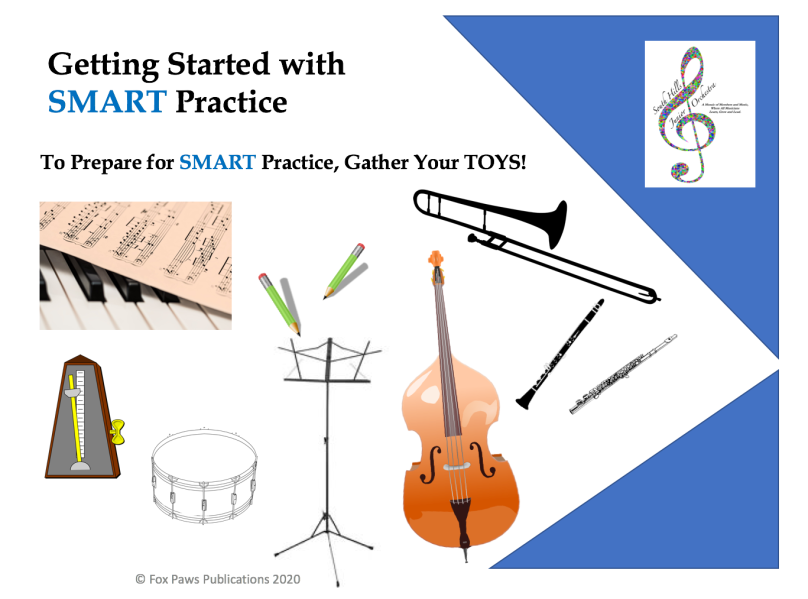
Success starts with a plan!
Begin with a long-range goal/dream.
- I will perform a solo with a symphony orchestra.
- I will become a professional musician.
- I will play in a college orchestra or band.
- I will enjoy music throughout my adult life.
Set medium-range goals.
- I will play a Mozart Concerto before I am 16.
- I want to upgrade to a better-quality instrument when I am 14.
Set and rest short-term goals on a weekly and even daily basis.
- This week, I will play the Bach Fugue with accurate fingerings and pitch.
- This week, I will play the Bach Fugue at performance tempo.
Here is an example of one violinist’s SMART Practice plan:

Tips on SMART Practice
- Warm-up with drills and exercises.
- Identify the key of each selection you are practicing.
- Play the scale for the key you have identified, using a rhythm or articulation pyramid.
- Select a passage to improve and mark the fingerings in pencil.
- Say the note names in half notes. (“If you can say it, you can play it!”)
- Be sure you practice every note as a half note using the fingerings provided by the conductor.
- Use a metronome to “keep it honest.”
- Practice VERY SLOWLY using the original rhythm and bowings/articulations.
- Gradually increase the tempo by “inching up” on the metronome.
- How many times have you played the passage correctly?
- Ten consecutive times right today, and ten more tomorrow, will already make the passage 20 times better than it was before!
- Schedule your next practice session.
- Reflect in your journal and set new short-term goals for tomorrow!
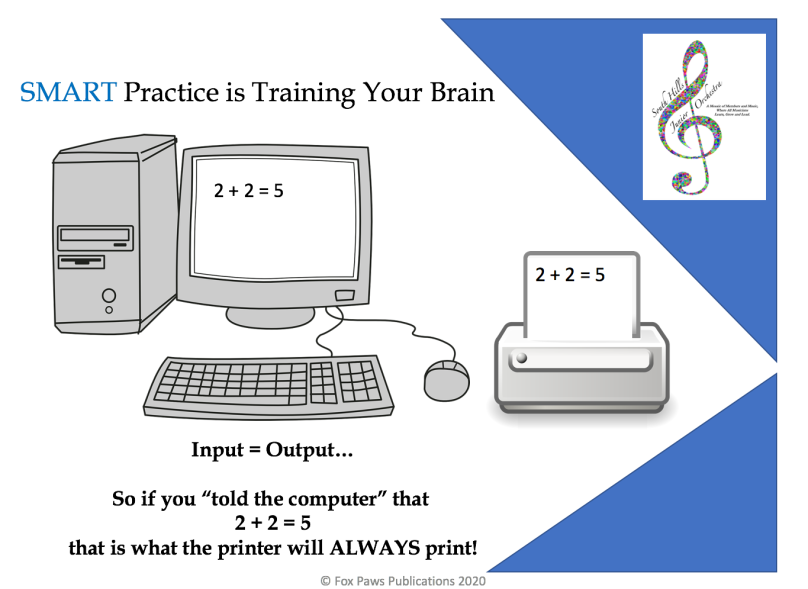
Training your brain is SMART Practice
- Practice is a process.
- Practice is all about habit development.
- Practice leads to self-confidence.
- Practice is an opportunity for self discovery.
- Practice is cumulative.
- Practice is where you can make mistakes privately.
- Amateurs practice to get it right.
- Professionals practice so that they never play it wrong.
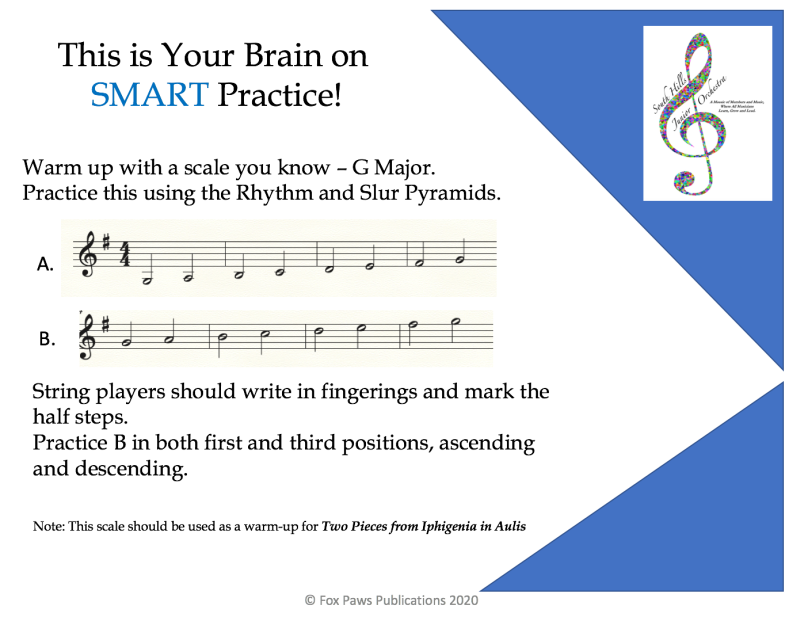
Variety is the spice of life and music variations challenge the mind!
You may have heard these strategies before:
- First make it easier, then progressively harder.
- First subtract (e.g. remove slurred notes) and then progressively add more challenging elements to the music (dynamics, longer phrases, articulations, fingerings, positions, memorization, etc.)
- First play it slower, then progressively faster.
- First take smaller sections (measure by measure, phrase by phrase), then progressively expand to larger sections, eventually being able to play the entire piece.
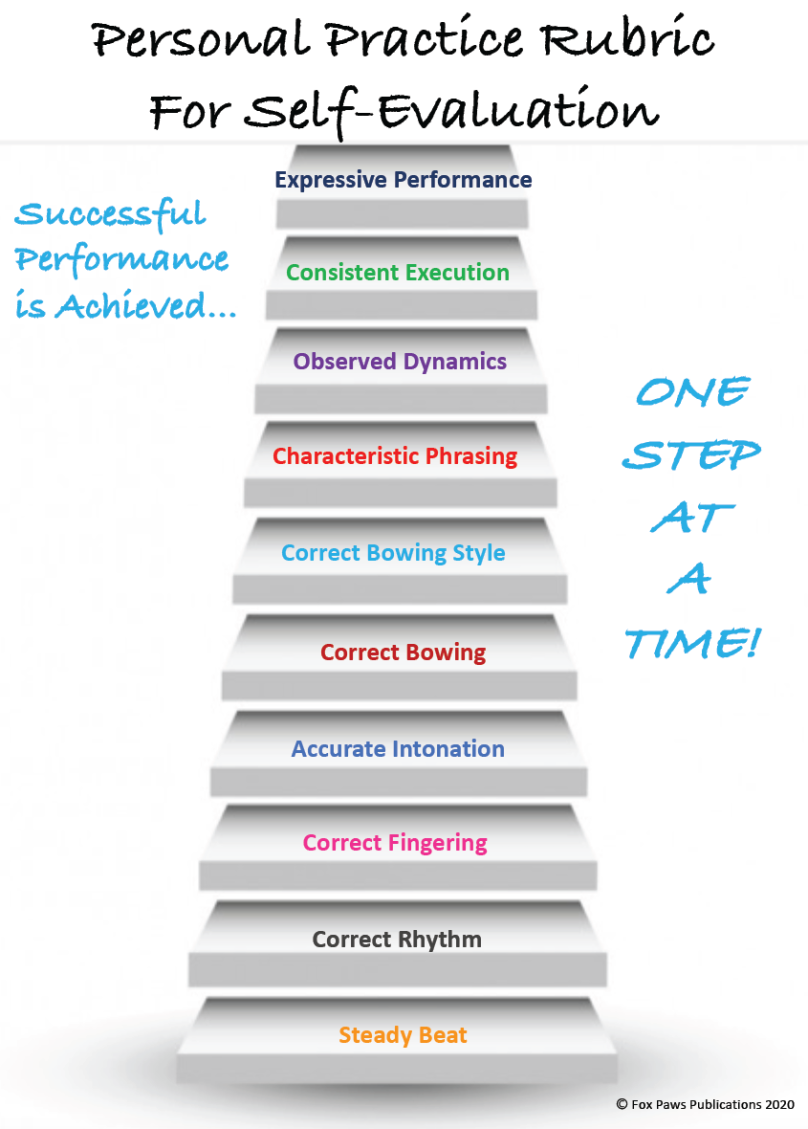
Try these rhythm and articulation pyramids on your scales, warmups, etudes, and any difficult passage in the music. Taking “baby steps,” create a new way to learn the part…
More to come… Part II will dive into additional recommendations for personal music problem solving with numerous examples.
Keep at it! You’ll make us all proud. Most importantly, especially yourself!
PKF
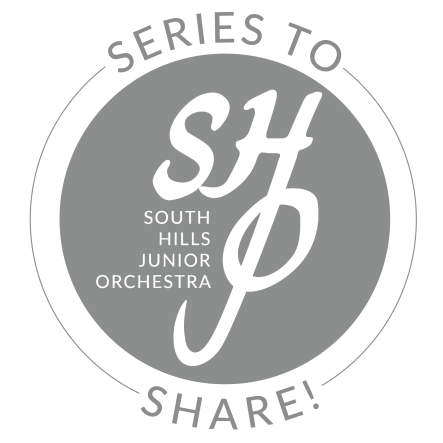
The mission of the nonprofit South Hills Junior Orchestra is to support and nurture local school band and orchestra programs, to develop knowledge, understanding, performance skills, and an appreciation of music, to increase an individual member’s self-esteem and self-motivation, and to continue to advance a life-long study of music. Members of the Orchestra learn, grow, and achieve positions of leadership to serve their fellow players.
The second half of our 37th season (Spring 2020) was postponed due to school closures and the pandemic. We are now offering SHJOOLA – the South Hills Junior Orchestra Online Academy. The program includes virtual sectional rehearsals, special workshop seminars via Zoom, and remote music learning activities, both synchronous and asynchronous instruction, and provides a one-year subscription to MusicFirst Classroom, PracticeFirst, Sight Reading Factory, Musition (music theory), Noteflight (score notation) and other apps. Western PA instrumentalists are welcome to apply for membership in one of the 25 remaining “seats” in SHJOOLA by contacting Managing Director Janet Vukotich.
(For more information about SHJO, please visit www.shjo.org.)
This and all Fox’s Fireside blog-posts are free and available to share with other music students, parents, directors, and supporters of the arts. For a printable, hard copy of this article, click here.
© 2020 by Paul K. Fox and Fox Paws Publications
Photo credit from Pixabay.com:
“Camp Fire” by



